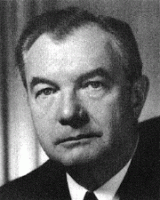Biographical Information

Robert H. Jackson was born on February 13, 1892 in Pennsylvania. Jackson moved with his family to upstate New York at a young age. After graduating high school, Jackson attended Albany Law School for a year. He then returned to Jamestown, New York to clerk in a lawyer's office and read for the bar. He became a member of the bar in New York in 1913. He is the last member of the Supreme Court to pass the bar examination without graduating from law school. Jackson was the epitome of the dedicated, savvy "country lawyer." For the next two decades, Jackson successfully practiced law. In 1928, Franklin Delano Roosevelt (FDR) became Governor of New York. Jackson worked informally with FDR during his two terms (4 years) as Governor. Jackson stumped for FDR during the latter's presidential bid in 1932, and in early 1934, Jackson left the private practice of law to work in the Roosevelt administration. In 1938, Jackson was appointed Solicitor General of the United States. The Solicitor General acts as the administration's voice before the Supreme Court, and also files amicus curiae (friend of the court) briefs in cases it deems important. In 1940, FDR appointed Attorney General Frank Murphy to the Court, and appointed Jackson to replace Murphy. Slightly more than a year later, Jackson was nominated to the Supreme Court seat vacated by Harlan Fiske Stone when he replaced Charles Evans Hughes as Chief Justice.
Like many New Dealers, Jackson was a strong proponent of nationalism. Early in his tenure on the Court, he wrote the Court's opinion in Wickard v. Filburn (1942), which laid to rest for over half a century claims made that Congress had violated the commerce clause. One of the great mysteries of Supreme Court history is why FDR's New Deal court never meshed. After a first term in which FDR made no appointments to the Supreme Court, he made nine (to seven different seats) in four years. Part of the reason is the personalities of those appointees did not mesh. Hugo Black was despised by Felix Frankfurter, who in turn was ridiculed and demeaned by William O. Douglas. Jackson and Black were involved in a terrific feud in the mid-1940s. Another part of the reason is that the New Deal Justices took different lessons from the Constitutional Crisis of 1937. For Frankfurter and Jackson, the Supreme Court was to exercise its power of judicial review (the power to declare Acts of Congress and state acts unconstitutional) sparingly. For Black and Douglas, the lesson was one of adherence literally to the text of the Constitution (Black), or suspicion of establishments in favor of individuals (Douglas). In any event, the New Deal Court was a fractured Court, unified by little other than their affection for and attraction to FDR and his policies.
In 1945, President Harry S Truman asked Jackson to serve as the United States' chief prosecutor at the Nuremberg War Trials following World War II. He did so, and his experience in Germany was unsatisfying. While Jackson was in Germany, Chief Justice Stone died. When Jackson had been appointed to the Court in 1941, he believed he had been promised the position of Chief Justice by FDR. But FDR was dead. Truman was inundated by supporters of both Jackson and Black. There is some evidence that suggests that both Jackson and Black were attempting to influence Truman by threatening to resign if the other was chosen, and eventually Truman nominated Fred Vinson. From Germany, Jackson exploded, publicizing the fact that Black had failed to recuse himself in a case involving Black's former law partner (the Jewell Ridge case), which resulted in a decision favoring the interests of the client of that former law partner. Although the feud between Jackson and Black later subsided, the event stained the Court's reputation.
Jackson was a consummate and uncommonly intelligent writer. His opinions sing. His most turn of phrase is from West Virginia Bd. of Educ. v. Barnette (1942). He stated: "If there is any fixed star in our constitutional constellation, it is that no official, high or petty, can prescribe what shall be orthodox in politics, nationalism, religion, or other matters of opinion."
Further reading: There is no good biography of Jackson, and there should be.
